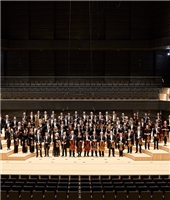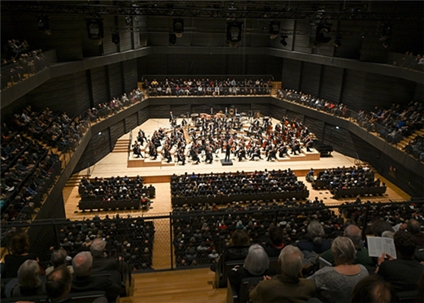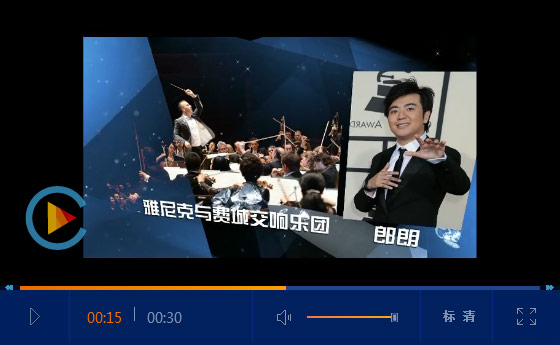
The Munich Philharmonic
The Munich Philharmonic was founded in 1893 through the private initiative of Franz Kaim, the son of a piano manufacturer. Since then, the orchestra has left an indelible imprint on Munich’s cultural life under the leadership of renowned conductors. In the orchestra’searliest years – initially under the name Kaim Orchestra – conductors like Hans Winderstein, Hermann Zumpe, Felix Weingartner and the Bruckner pupil Ferdinand Löwe guaranteed both a high technical standard of performance and enthusiastic support of contemporary artistry.
Gustav Mahler directed the orchestra in 1901 and 1910 at the respective world premières of his Fourth and Eighth Symphonies. In November of 1911, the orchestra, then called the Konzertverein Orchestra performed the world première of Mahler’s Das Lied von der Erde (The Song of the Earth) under Bruno Walter’s direction – only six months after the composer’s death in Vienna.
Ferdinand Löwe conducted the first large-scale Bruckner concerts and thereby founded the orchestra’s Bruckner tradition, which has continued unbroken to the present day.During the administration of Siegmund von Hausegger, who guided the orchestra as its General Music Director from 1920 to 1938, the world premières of two Bruckner symphonies in their original versions took place as well as the final, definitive change of the orchestra’s name to Munich Philharmonic. From 1938 to the summer of 1944, Austrian conductor Oswald Kabasta led the orchestra.
The first concert after the Second World War was opened by Eugen Jochum. With Hans Rosbaud, the Philharmonic gained a man who passionately advocated modern music. Rosbaud’s successors were Fritz Rieger and Rudolf Kempe.
In 1979, Sergiu Celibidache was appointed General Music Director. The legendary Bruckner concerts made a major contribution to the orchestra’s international standing, and during the Celibidache era the orchestra was repeatedly invited to accompany the Federal Government or the Federal President as musical ambassadors.
Following the wartime destruction of its old home, the so-called Tonhalle, the orchestras spent over forty years in Munich’s Herkulessaal. In 1985, the Philharmonic once again acquired its own concert hall with the Philharmonie in the Gasteig, Munich’s municipal cultural centre.
From September 1999 until July 2004, James Levine was Chief Conductor of the Munich Philharmonic. In January of 2004, the Munich Philharmonic named Zubin Mehta the first Honorary Conductor in the history of the orchestra. For the 100th anniversary of the première of Gustav Mahler’s Symphony No. 8 in Munich, Christian Thielemann conducted two performances of this work in October 2010. He was succeeded as chief conductor by Lorin Maazel, who held the position until his death in 2014.
From 2015 to 2022 the position of chief conductor of the Munich Philharmonic was held by Valery Gergiev. Programme highlights conceived by Valery Gergiev include performances of symphonic cycles by Shostakovich, Stravinsky, Prokofiev and Rachmaninov as well as new formats, such as the MPHIL 360° festival. In September 2016, the first CD recordings documenting the Munich Philharmonic’s work were released under the orchestra’s own label, MPHIL . From 2017 to 2019, the Munich Philharmonic and Valery Gergiev recorded all of Anton Bruckner’s symphonies in the basilica of St. Florian Monastery, Anton Bruckner's final resting place.
With Spielfeld Klassik, the Munich Philharmonic has developed a comprehensive music education programme for young and old. Up to 35,000 people of all ages attended the more than 150 events held each year. Under the motto of MPhil vor Ort (MPhil on Site), the Munich Philharmonic also leaves its home base to appear in unusual and varied locations, such as the Hofbräuhaus tavern as well as alpine meadows, clubs and industrial halls.
On October 13th, 2018 the Munich Philharmonic and Valery Gergiev celebrated the 125th anniversary of the Munich Philharmonic by performing Igor Strawinsky's Symphonie de Psaumes and Gustav Mahler's Symphony No. 8.
In October 2021, the Munich Philharmonic inaugurated the Isarphilharmonie – the orchestra’s new home and concert hall while the Gasteig is being renovated. The hall was designed by architects Gerkan, Marg und Partner, with the acoustics designed by Yasuhisa Toyota and his company Nagata Acoustics. True to the Munich Philharmonics’ new motto, Being approachable and breaking new ground, the orchestra is expanding its festival programme and will create new points of access for audiences with formats such as mphil late, NACHtKLANG and Wandelkonzerte to be held regularly from now on.
In March 2022 Lahav Shani conducted Munich’s Benefit concert in aid of Ukraine at the Isarphilharmonie with Anne-Sophie Mutter and the three orchestras of Munich, Bayerisches Staatsorchester, Symphonieorchester des Bayerischen Rundfunks and Münchner Philharmoniker. He returned to the Münchner Philharmoniker for a concert series in Munich and Switzerland in September 2022. In February 2023 the Münchner Philharmoniker appointed Lahav Shani as their new Chief Conductor, starting from September 2026.






